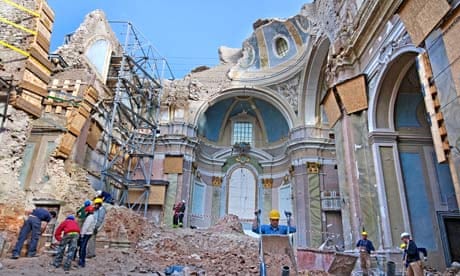The Italian judge who sentenced seven of the country's natural disasters experts to six years in jail for manslaughter in connection with statements they made before the L'Aquila earthquake of 2009 has criticised the advice they gave as "vague, generic and ineffective".
Explaining his judgment, Marco Billi, the judge who in October stunned the scientific world by handing down sentences even harsher than the prosecution had requested, said the experts had given reassuring statements in the days before the quake that might have led some residents to stay in their homes.
"The assertions made concerning the assessment of risks connected to the seismic activity in the area around L'Aquila turned out to be completely vague, generic and ineffective," Billi wrote. Three hundred and nine people died and tens of thousands were made homeless when the earthquake struck the town in the central Abruzzo region of Italy.
The six seismologists and one government official sentenced included Enzo Boschi, former president of Italy's National Institute of Geophysics and Volcanology, who on Friday rejected the judge's accusations. "I absolutely do not feel guilty," he told Ansa news agency. "Does the judge not think that, after having spent years exposing the seismic nature of Italy, I would have suddenly said that there was no risk of earthquakes in L'Aquila? It's all senseless. What reason would we have had for reassuring people? What would we have gained by it?"
In his explanation – which, under Italian law, a judge has to publish within 90 days of a sentencing, and which, in Billi's case, ran for more than 900 pages – he was at pains to say the experts had not been sentenced for failing to predict the earthquake, a task he acknowledged was impossible.
"'Science' is not being put on trial for not having succeeded in predicting the earthquake of April 6th 2009," he wrote. "The task of the accused … was certainly not to predict the earthquake and indicate the month, day, hour and magnitude, but rather, more realistically, to go ahead ... with the 'prediction and prevention of the risk'".
The experts, who were members of the National Commission for the Forecast and Prevention of Major Risks, will remain free pending the appeals process.
